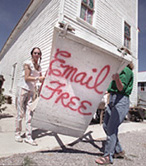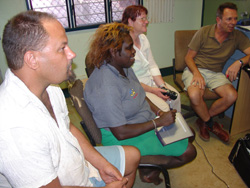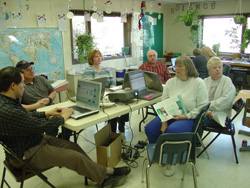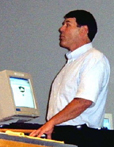
|
|
What is a Community Network? And Why You Should Care!
A Short Historical Overview  Judie Halazon, an early CTC pioneer, offered Free Email from her one computer CTC in Jackson, MT, pop. of 48, starting an rural ecommerce legacy. The term "community networking" originally referred to common community gatherings where everyone gets to know one another. The motivator was making essential connections with those locally who share your interests and understand your needs. In the mid-eighties the term began to be used in reference to people getting to know one another online locally—with the growing potential for gathering and sharing ideas and resources with anyone, anywhere, anytime. During this time, “online” community networks—Free-Nets—were formed to provide free dialup Internet access when none was available. Then—and today—many use the term “community networking” in reference to installing Internet infrastructure and nothing more. And many presumed—and presume today—that once Internet access has been achieved, the benefits are obvious and come naturally. But the deeper purpose of community networks then, and now, is to create a shared online space for people working together to make good things happen for their communities. The broadest definition of the term ”community networking” refers to a dedicated group of people working together for a defined purpose, people working together online to realize a shared cause.Here is one example of a potential shared mission, written for the Association for Community Networking in 1995: We, the members of AFCN, hold these truths to be self-evident:
Technology Overload and Promising Corporate Foundations
New businesses intent on the commoditization of social interaction are pushing us to join all manner of new communities, from eharmony.com to linkedin.com and more, using all kinds of new technologies— weblogs or blogs as public web journals, v-logging as video blogs, podcasting via RSS—and if you’re feeling confused, you’re not alone. Many adults are lost in this blizzard of accelerating innovation. The U.S. is now somewhere between 15th and 20th in the world for broadband deployment. Yet, amidst the confusion, what we have is the opportunity to select the specific information flows we want to have in hand – literally in our hands via handheld devices like Ipods, Blackberries, or Treo hybrid PC/Cell phones – including multi-media citizen generated broadcasts from any of the growing number of diverse virtual communities. We’re seeing an accelerating evolution of innovation unleashed by dropping costs for PCs, software and Internet access. Cellphones are rapidly becoming sophisticated handheld PCs capable of two-way multimedia just-in-time elearning communication. And corporate developers are laying the foundation for new community networks. 
JJ Sport owner Shane Johnson started by selling one bat on Ebay, and sprouted a 1,000 website affiliates program and expanded into five new product lines in five years.
EBay promotes the slogan “The Power of All of Us” referring to the power of many buyers and sellers. By providing a global model for “everyman’s ecommerce” based originally on facilitating online communities for collectors, eBay stands as the most successful model of online community-building in the world (see “The Power of All of Us: The eBay Lesson for Community Development”). Today eBay, Yahoo, Amazon, Google and other large corporations are beginning to focus on providing localized services—free collaborative tools (groups.yahoo.com), free ecommerce web sites (tripod.com), free resume-building with local job searches (monster.com), local searches (google.com), local sales (froogle.com), local maps (mapquest.com), local classified ads (Craig's List), local satellite images and GIS mapping tools (earth.google.com), and even local dating (eharmony.com). But is a Wal-mart version of local community networking all we have to look forward to? What are the risks? Amid the big business and advancing technology, what role do “we the people” play? Are we merely consumers or can we participate as producers? Will the telco networks and megacorporations define community for us, or will our communities define these networks to suit community goals instead of corporate goals? Where and how does “top-down” meet “bottom-up.” How can the users partner meaningfully with the builders of these networks? With the push of these megacorporations and their rush for global dominance, somewhere missed is the mission of communities to do for themselves building local collaborative capacity. Certainly there are many positive services these corporations can provide which rural communities in particular cannot create for themselves, such as access to satellite images. What is the ideal role for local citizens to generate their own local content for the benefit of the community? The answers here point to the future of community networking. If we all share what we know, we’ll all have access to all our knowledge
With one billion people online, and six billion more due to come online in our lifetime, we share unprecedented opportunities to educate the global population, literally. Our historic opportunity is to work together to learn how best we can keep each other up to the same instant of progress on an ongoing basis—gathering and disseminating innovations as they occur — from global sources, while providing knowledge support systems for learning as the need arises. With each new person who comes online, the potential power of the Internet to benefit others grows. Each new person has the potential to learn from, and to teach anyone, anywhere, anytime. As new skills are acquired, the potential global impact of each individual grows dramatically. As more people learn new collaborative skills, their collective impact becomes exponentially greater. 
Kathryn, an Aboriginal in Yagga Yagga, Australia, explores use of a graphic arts tablet to create aboriginal art, available at Desart Art Centers.
Improving technologies for Internet access, such as wireless, are projected to allow free wireless Internet access as the possible norm, a trend already beginning to appear in major population areas. Also appearing are unlimited free multimedia elearning resources, and open source (free) software, all of which are opening minds to the inherent global potential of the power of all of us. Modular online instruction services already exist, at, for instance, New Horizons and ed2go.com. Skills tutorials complete with assessments, e.g., those at proveit.com, allow anyone to learn online and then demonstrate their skill competencies. While there are lots of free tutorials, lessons, and online courses, there is still a lot of innovation yet to take place in this emerging "marketplace of learning," particularly regarding peer-mediated learning, both offline and online. Most of us prefer to have someone locally help us learn and this creates major opportunities for both volunteerism programs as well as new for-profit local community cooperative services. The Internet has unleashed unprecedented entrepreneurial creativity worldwide. Mining the best of these innovations to bring home to empower local communities is a task we will all work together to achieve. Engaging the members of our communities to understand where to go to learn that new knowledge which creates new opportunities is proving to be more and more important to individual and community sustainability. Our key challenge becomes how to identify the best expertise and greatest wisdom for local and global dissemination…on an ongoing basis. The potential exists for the wisdom and creative writing and curriculum development of a single individual to impact huge numbers of individuals. Already, some web journals, weblogs or blogs, by such individuals enjoy a readership of thousands. Such blogs are likely to evolve into fast-track elearning pathways designed to impart new skills and capabilities as quickly as possible further leveraging the proliferating array of free web tools.  Ron Ridesatthedoor, CEO of sunroadsfarmory.com, presents Montana's first rural Webraising workshop in a one room school in Zortman, MT, pop. 48. Community Networks of geographic place and peer-to-peer social networks have already demonstrated the potential. At wikipedia.org over one million topical articles have been donated, creating a robust resource that already rivals the Encyclopedia Britannica as but one example of the future potential of the power of all of us. Social and economic innovations are merging as new online services in an innovation economy where ideas, resources, and education can be shared without restriction with everyone on earth. These trends present us with the opportunity for the most dramatic positive global change in the history of humankind. The stage is set for everyone to realize their potential as learner and teacher, consumer and producer, all the time. 
Hyperlinks references in this article: Comments
|